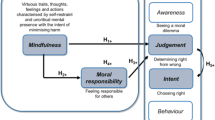Abstract
This essay accounts for Mengzi’s 孟子 failure in persuading King Xuan of Qi (Qi Xuan Wang 齊宣王) to act morally. We argue that the distinction between internal and external reasons in contemporary philosophy helps to highlight the nature of the failure. The problem of nontransmission of the compassionate impulse within a person despite moral persuasion, which Mencians need to address in order to enhance the success of moral conversion, is now explained as a result of misdirecting the advisee to the lofty ideal of sagehood. We conclude by proposing a proleptic understanding of external reasons within a pragmatic model of giving moral advice.
Similar content being viewed by others
References
Anscombe, Gertrude Elizabeth Margaret. 1958. “Modern Moral Philosophy 1.” Philosophy 33.124: 1–19.
______. 2000. Intention. Cambridge, MA: Harvard University Press.
Blackburn, Simon. 2001. Ruling Passions. Oxford: Clarendon Press.
Connolly, Timothy. 2013. “Sagehood and Supererogation in the Analects.” Journal of Chinese Philosophy 40.2: 269–286.
Cua, Antonio S. 2001. “Xin and Moral Failure: Reflections on Mencius’ Moral Psychology.” Dao: A Journal of Comparative Philosophy 1.1: 31–53.
Huang, Yong. 2010. “Confucius and Mencius on the Motivation to be Moral.” Philosophy East and West 60.1: 65–87.
______. 2013. “Virtue Ethics and Moral Responsibility: Confucian Conceptions of Moral Praise and Blame.” Journal of Chinese Philosophy 40.3–4: 381–399.
Lau, D. C. 2003. Mencius: A Bilingual Edition. Hong Kong: The Chinese University Press.
Liu, Xiusheng. 2002. “Mengzian Internalism.” In Essays on Moral Philosophy of Mengzi. Indianapolis: Hackett Publishing.
McDowell, John. 1995. “Might There be External Reasons?” In World, Mind, and Ethics: Essays on the Ethical Philosophy of Bernard Williams, edited by J. E. J. Altham and R. Harrison. Cambridge: Cambridge University Press.
Pettit, Philip, and Michael Smith. 2006. “External Reasons.” In McDowell and His Critics, edited by Cynthia Macdonald and Graham MacDonald. Oxford: Blackwell.
Shafer-Landau, R. 1998. “Moral Motivation and Moral Judgment.” Philosophical Quarterly 48: 353–358.
Shun, Kwong-loi. 1997. Mencius and Early Chinese Thought. Stanford: Stanford University Press.
Svavarsdottir, S. 1999. “Moral Cognitivism and Motivation.” Philosophical Review 108: 161–219.
Tresan, J. 2009. “The Challenge of Communal Internalism.” The Journal of Value Inquiry 43: 179–199.
Williams, Bernard. 1981. “Internal and External Reasons.” In Moral Luck. Cambridge: Cambridge University Press.
______. 1993. Shame and Necessity. Berkeley: University of California Press.
______. 1995a. “Internal Reasons and the Obscurity of Blame.” In Making Sense of Humanity, and Other Philosophical Papers 1982–1993. Cambridge: Cambridge University Press.
______. 1995b. “Moral Incapacity.” In Making Sense of Humanity, and Other Philosophical Papers 1982–1993. Cambridge: Cambridge University Press.
______. 1995c. “Replies.” In World, Mind and Ethics: Essays on the Ethical Philosophy of Bernard Williams, edited by J. E. J. Altham and Ross Harrison. Cambridge: Cambridge University Press.
______. 1995d. “Who Needs Ethical Knowledge?” In Making Sense of Humanity, and Other Philosophical Papers 1982–1993. Cambridge: Cambridge University Press.
______. 2001. “Postscript: Some Further Notes on Internal and External Reasons.” In Varieties of Practical Reasoning, edited by Elijah Millgram. Cambridge, MA: MIT Press.
Wong, David B. 1991. “Is There a Distinction between Reason and Emotion in Mencius?” Philosophy East and West 41.1: 31–44.
Xiao, Yang. 2009. “Agency and Practical Reasoning in the Analects and the Mencius.” Journal of Chinese Philosophy 36.4: 629–641.
Author information
Authors and Affiliations
Corresponding author
Ethics declarations
Declaration
The author declares that there is no conflict of interest.
Additional information
Publisher's Note
Springer Nature remains neutral with regard to jurisdictional claims in published maps and institutional affiliations.
Rights and permissions
Springer Nature or its licensor (e.g. a society or other partner) holds exclusive rights to this article under a publishing agreement with the author(s) or other rightsholder(s); author self-archiving of the accepted manuscript version of this article is solely governed by the terms of such publishing agreement and applicable law.
About this article
Cite this article
Young, D., Ming, T. Looking for Reasons to be Good: Mengzi as a Moral Advisor. Dao 22, 555–575 (2023). https://doi.org/10.1007/s11712-023-09906-7
Accepted:
Published:
Issue Date:
DOI: https://doi.org/10.1007/s11712-023-09906-7




